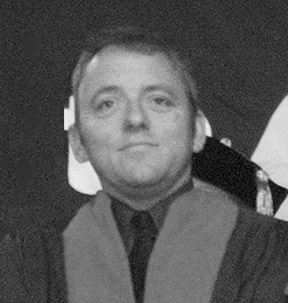The Big Score: An Interview With Dennis Lehane

Mystic River author Dennis Lehane – Photo by Gintautas Dumcius
June 9, 2004
Slouched back in the rickety office chair, Lehane wrinkled one eye against the blank white light streaming through the harbor window and fixed the other on the man in front of him. Leaning forward over the low brown table, an office-supply catalog remnant of the unhallowed post-seventies age of décor, the man in front of him had a high, nervous edge to his voice and a high-wire tension in his shoulders. He was getting a shot, not his first shot, maybe not his best shot, but a big shot: an interview with the heir to the crown of the urban novelist, the prince of new noir, the voice of Boston, Dennis Lehane. It wasn’t a favor he’d soon forget.
Currently writing for the edgy HBO drama, “The Wire,” Lehane is a well-known figure around town, a native son, and an author very much in demand. His novels featuring detectives Angie Gennaro and Patrick Kenzie have become modern pulp classics, and his bestseller Mystic River was made into an Academy Award winning film by Clint Eastwood last year. Lehane is also teaching at Stonecoast, a low-residency summer program for writers hosted by the University of Southern Maine.
The Mass Media caught him last Thursday between an interview he gave to UMB folk radio 91.9 and his special Master Class to aspiring writers. Lehane barred the press from his master class and his appearance on campus last Thursday, so this interview is printed here with a note of thanks.
The Mass Media: First thing, what’s it like being you?
Dennis Lehane: It’s a walk in the park? I don’t know, it’s being me. I don’t know what else to say.
MM: I’d heard that you were out in L.A. working on screenwriting projects and things like that.
DL: Ooh-dead wrong. Definitely not, don’t like L.A., avoid L.A. like the plague. I don’t like to fly. So, uh, no. The screenwriting I’m doing is actually in Baltimore, I’m working on the TV show “The Wire,” which is an HBO show. Some friends of mine were involved in that, so they asked me to do it, and I loved the show and I love HBO, so, that’s the kind of stuff I do. And I’m working on my novel.
MM: Your new novel?
DL: Yeah.
MM: What’s the name of it?
DL: Doesn’t have a name yet.
MM: Do you have to go to Baltimore to work on the show?
DL: I’m going down actually in a couple days to see them shoot one of my scenes. I’m really excited.
MM: Is that the first time you’ve seen them shoot your scenes?
DL: That’s the first time I’ve seen them shoot on “The Wire.” I wrote a huge ‘wild bunch’ action sequence in the middle of the episode. That’s not normally the kind of thing I write, so it’ll be fun just to watch it.
MM: Was there a big leap from novels to scripts?
DL: No, I think you just reorder your thinking a bit, think in terms of your character in action.
MM: I gotta ask, I’m sure you’ve heard it a million times, so, what did you think of the movie?
DL: I really liked the movie a lot; I can only judge it based on its parts, I couldn’t judge it as a whole. It’s impossible for me to have any sort of suspension of disbelief. I thought the performances were astounding, the screenplay adaptation was absolutely incredible – I couldn’t have done it – I thought the direction was great, I thought the photography in particular was gorgeous, so, those are the four major parts, which were great, so I guess I thought it was great. I can’t tell you wholly what I would have thought.
MM: Is that because it’s yours?
DL: Yeah! You just can’t judge your own work. You’re just sitting there and looking at it and going, “That’s…a world that isn’t my world.” It’s different than what was in your head. It was a beautiful, it was extremely faithful, and I’m grateful.
MM: So you’re living in Boston, hanging out – what’s your schedule like? Do you get tapped for charity events?
DL: Yeah. I’m going over to one in two hours. There’s certain things… I’m very easy. I don’t like to appear in public much, it’s not really where I’m comfortable, but there’s certain areas where everybody knows you can get me. Something for a library, something for certain types of charities, literacy programs, then I’m an easy mark. If it’s just a high society kind of deal, I’m the last guy you’ve got.
MM: So, why’d you accept the honorary degree? And why’d you come to UMass?
DL: Well, UMass, because it’s a great institution, I mean, this is public education. Particularly at this level, I’ll do anything I can to call attention to that. I was seven-years-old when they opened this place, and it was a big deal – this was the neighborhood I grew up in – I’m an 02125 guy. And I remember my mother saying that it was a great day for the family, because from that day on, they knew they could send any of their kids to college.
When I went here, it was less expensive than my high school tuition, and yet we’re not talking about a Mickey Mouse school, we’re talking about a great four-year accredited university with fantastic teachers and very good programs, so it’s not like we’re talking about certain community colleges I could name…
MM: So you were here for a year?
DL: A year, which I think is hilarious, that they’re actually giving me a degree. I do, I see the hilarity in that. My mother’s very excited.
MM: A lot of people at UMass find it hilarious they’re getting a degree.
DL: It is interesting. You drop out, you get a Ph.D….it’s a very nice gesture. I’m happy. I can recognize the irony and still be very touched.
MM: When you write your novels, what’s your writing process? Are you one of those sit-in-a-closet guys and write until you’re done, do you break it up, do you have a workday?
DL: It varies from project to project. When I’m working at a book, the best thing in the world for me is a deadline, people screaming at me.
MM: Nothing like terror?
DL: Well, yeah, nothing like the feeling that ‘Jesus, okay, now it’s serious’ to get it done. I drag. I’d never finish a book if it wasn’t for deadline, ’cause I worry them. I could worry my books to death. That was a big danger with Mystic River. But my process is pretty scattershot. Usually early on in book I’m writing about an hour a day, and by the end I’m pulling 12-16 hour days no problem. Very happy, very energized. My process varies.
MM: What do you do other than write?
DL: Two dogs. I don’t have much in the way of hobbies. I like to shoot pool, that’s about it. My hobby became my life, if you think about it. Writing was the thing, you know – if I got an hour away from my friends or away from my roommates or away from my ‘job’ or away from whatever I was doing at the time – that was my joy.
MM: What’s it like now that you made it, now that you’ve got some money, now that people return your phone calls, now that people go, “That’s Dennis Lehane!!”?
DL: Um, I stay away from that. The moment you buy into that crap is the moment you’re dead, certainly as any sort of artist. So I don’t lock into it, which is why I don’t go to L.A., which is why I don’t go to society parties, why I don’t accept a lot of invitations, because I want the work to remain the work and I want to stay very much in my life.
Do I like it every now and then? Yeah, I can get good tickets to Pats games. I like that, I do. That’s a nice perk. Or if I want to go to a concert, I can call my publisher, go directly to my publisher and get in to the Fox Box to see Springsteen, which was nice. I’m not above using that, or enjoying that.
Any writer who writes for fame has got to be the stupidest human being on the planet. More people saw “When Animals Attack 3” on the WB last week than have ever read John Updike. So that should put it in perspective. As for the fame, man, geez, there’s a lot of easier ways. I think [writing is] a great profession because I don’t get recognized much; I write my books and people read them and write me very nice letters about them.
MM: Do you still hang out in the neighborhood?
DL: Sure, oh yeah. I was down in Savin Hill about a month ago. And it’s great. It’s great to see those people and it’s very humbling to see how many people come up to me and say ‘thanks for putting this neighborhood on the map.’ Man, I feel like I just got lucky. I just got lucky. And that helps you to keep your perspective, because if I don’t, believe me, one of my friends will remind me.
MM: One last question: what are you going to teach at the Master Class?
DL: Not telling you.
MM: No?
DL: Noooo.










































































